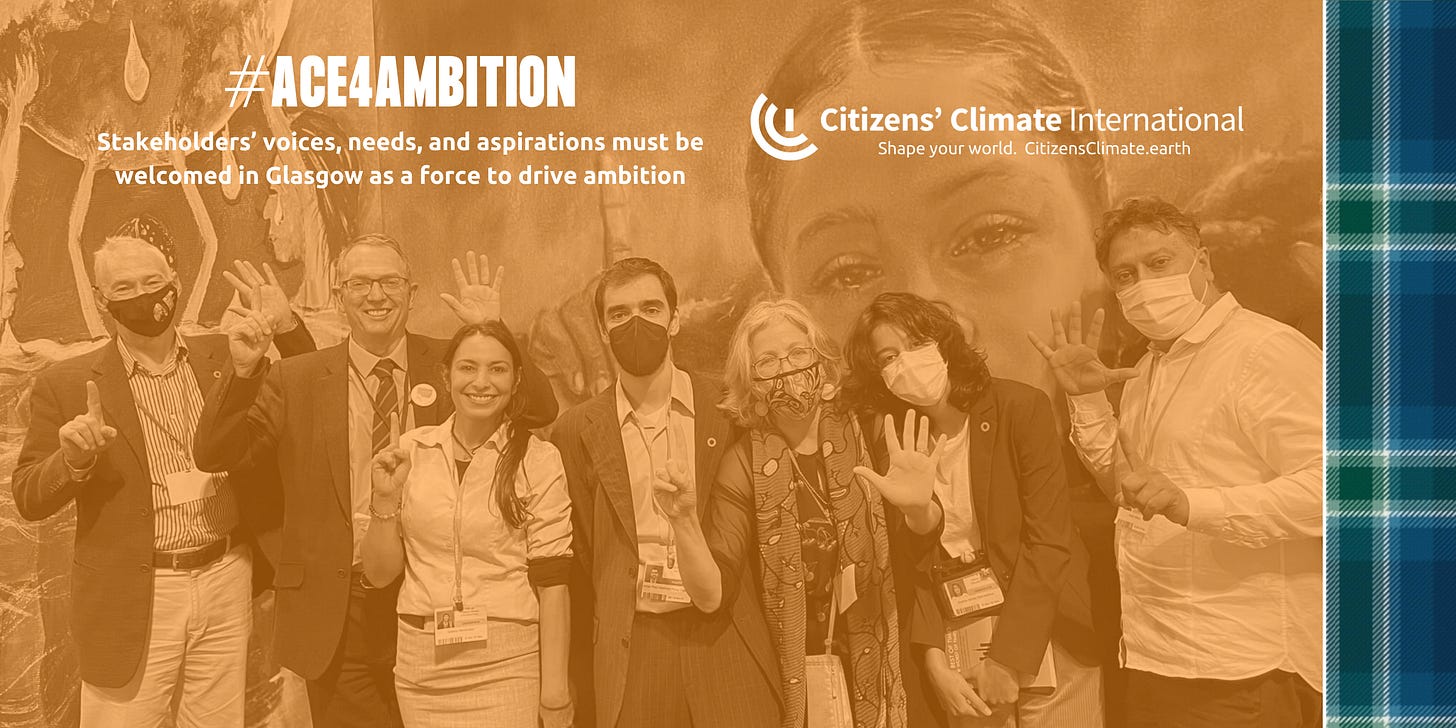Informed participation is an engine of climate progress and future prosperity
Informed participation is vital to the success of any human endeavor. Putting detailed, engaged attention into the work of shared decision-making is sacred, because it allows for better ideas to fill the space and for reason to discover their value. This is how people of differing minds and priorities come together, and how we come to make better decisions together.
This is why democracies require the protection of every person’s rights. To fail to protect anyone’s humanity is to threaten the liberty and dignity of all. To give unfair advantage to those who refuse to be accountable or to serve the humanity of others is to undermine the capacity of a group for effective, adaptive decision-making.
It is in this light that we take stock of the Glasgow Work Programme on Action for Climate Empowerment. Action for Climate Empowerment is grounded in Article 6 of the United Nations Framework Convention on Climate Change and Article 12 of the Paris Agreement, and encompasses:
Education
Training
Public Awareness
Public Participation
Public Access to Information
International Cooperation
Each of these is critical to enabling informed participation to play a role in adaptive decision-making, to secure a livable climate future. Failing on any of these makes it harder for all of us to achieve that better future. And science makes clear: geophysics will not compromise to give us a pass on poor planning; we cannot afford to let incumbent powers force our future plans to lower ambition.
In our outline of aims for the new Work Programme, we noted that assertive, coordinated, and inclusive action on all 6 elements of ACE can, and should:
foster locally rooted active public participation in climate-related decision-making,
ensure the flow of sound scientific information, climate action planning aligns with higher ambition,
build capacity for communities, industries, and public agencies, to meet bold climate goals,
and attract additional resources attuned to that enhanced ambition and capacity.
We want to see an enhanced role for communities, stakeholders, science insights, and green economy preparations, in raising climate action ambition at all levels. National governments should see the planning and coordination of robust climate action as easier, given the groundswell of innovative action toward specific goals happening at local and regional levels.
Specifically, we note that the Glasgow Work Programme recognizes:
the importance of all six elements of Action for Climate Empowerment… to achieving the objective of the Convention and the purpose and goals of the Paris Agreement…
the key role that a broad range of stakeholders, such as national, regional and local governments, educational and cultural institutions, museums, the private sector, intergovernmental organizations, non-governmental organizations, international organizations, decision makers, scientists, the media, teachers, youth, women and indigenous peoples, play in ensuring Action for Climate Empowerment…
the importance of linkages between activities undertaken to support Action for Climate Empowerment and other relevant international arrangements, including the 2030 Agenda for Sustainable Development and Education for Sustainable Development for 2030, as well as regional agreements…
It also asks countries to take “a long-term, strategic, and country-driven approach” to ACE activity. We consider this to mean, concretely:
Long-term science-based participatory decision-making must “foster low-emission, climate-resilient and sustainable development”.
Strategic ACE activity must build capacity early to optimize the landscape for investment flows to a climate-smart economy aligned with the 1.5ºC temperature goal—meaning 50% global decarbonization by 2030.
Country-driven approaches must be rooted in and focused on securing dignity, opportunity, and wellbeing for the people, of whom the country is comprised.
In each of these cases, it is clear that ACE provides an opportunity for enhancing local capability, expanding economic opportunity, reducing climate-related risks and costs, and for strategically accelerating a nation’s contribution to the overall global response to dangerous climate disruption. There is an implicit purpose to use ACE to position a country as a leader in the green economy.
ACE activity is catalytic, so the four thematic priority areas laid out in the Glasgow Work Programme should be addressed with that in mind:
Policy coherence
Coordinated action
Tools and support
Monitoring, evaluation, and reporting
So, the convenings, assessment processes, reports, and sharing of ideas laid out in the Work Programme are intended to ensure emerging leaders in public service and in the private sector approach their work with an enhanced understanding of how to align local experience, strategic planning, and climate science insights, to achieve an everyday reality that is safe, prosperous, inclusive, and conducive to 1.5ºC or less of global heating.
Sharing of knowledge and information should be gender-inclusive, intergenerational, and respecting of the needs, priorities, and wisdom of diverse, vulnerable, and indigenous communities. All available skills, capabilities, and experiences have a role to play in achieving a livable climate future.

We welcome especially the recognition of the need for Parties and non-Party stakeholders to work together to promote, facilitate, develop, and implement programs for education, public awareness, public access to data and information. And, we welcome the recognition that Parties and non-Party stakeholders should promote and sustain public participation for enhanced climate policy and to facilitate more constructive and catalytic international climate cooperation.
We proudly celebrate the work of our team in coordinating the People’s Pavilion at COP26, a virtual climate empowerment lab opening up the international process to stakeholders around the world. The People’s Pavilion ran for 15 days, streamed 51 sessions, included 20 exhibitors, and welcomed 1,000 virtual participants, and had support from VoLo Foundation, the SWFL Reset Center, ECOS, Floor, the US ACE Coalition, and the CCI team.
Finally, we would like to take stock of the fact that the Glasgow Work Programme calls on Parties (countries) to develop tools and provide training to enhance climate change skills and comprehension across sectors, preparing their whole society to be contributors to better geophysical and economic climate-related outcomes. And, we thank the COP26, the CMA3, and the SBI, for recognizing the need for ongoing and varied public participation in climate-related decision-making, including “frequent civil society consultations… including follow-up processes”.
We see these as clearly outlining the universal need to mainstream ACE activity into all areas of climate-related planning and decision-making, ensuring narrow interests do not have undue leverage to slow or reverse urgently needed climate action and innovation. Those nations that successfully mainstream ACE activity, and develop means for distributed science activation work, across their societies, will position themselves as geopolitical, economic, and financial leaders in the 1.5-aligned new climate economy.
In the coming weeks and months, we will provide new insights about the landscape of ACE activity from our network and from the wider community of Parties and non-Party stakeholders leading on this critical work. We will also report on our work towards a stakeholder-driven Science Activation General Assessment (SAGA). And, we will provide insights from key allies toward the shaping of an inclusive, adaptive, catalytic ACE action plan for work under the Glasgow Work Programme.
For more information about ACE activities, please visit:
Our ACE4Ambition Program
This is a policy and process brief from Citizens’ Climate International.



